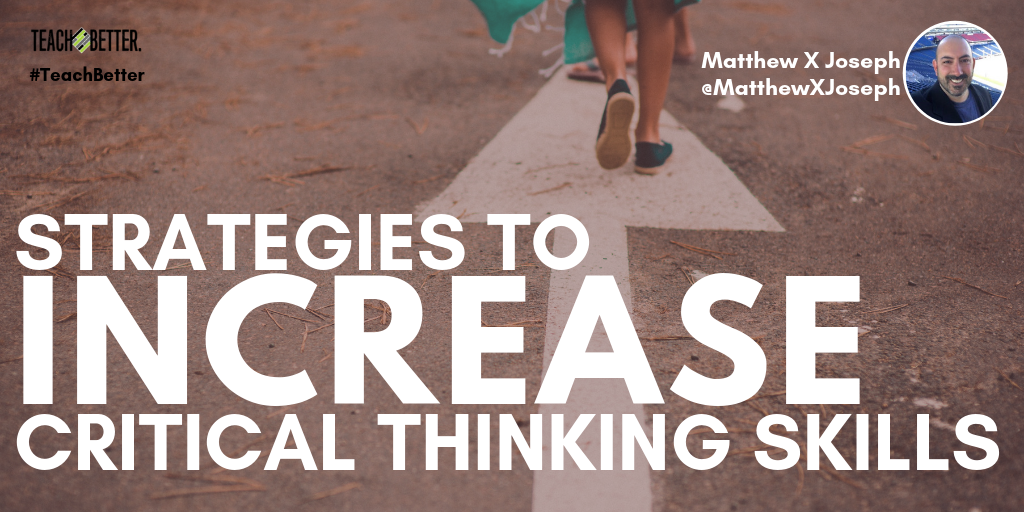In This Post:
- The importance of helping students increase critical thinking skills.
- Ways to promote the essential skills needed to analyze and evaluate.
- Strategies to incorporate critical thinking into your instruction.
We ask our teachers to be “future-ready” or say that we are teaching “for jobs that don’t exist yet.” These are powerful statements. At the same time, they give teachers the impression that we have to drastically change what we are doing.
So how do we plan education for an unknown job market or unknown needs?
My answer: We can’t predict the jobs, but whatever they are, students will need to think critically to do them. So, our job is to teach our students HOW to think, not WHAT to think.
Our job is to teach our students HOW to think, not WHAT to think. Click To TweetHelping Students Become Critical Thinkers
My answer is rooted in the call to empower our students to be critical thinkers. I believe that to be critical thinkers, educators need to provide students with the strategies they need. And we need to ask more than just surface-level questions.
Questions to students must motivate them to dig up background knowledge. They should inspire them to make connections to real-world scenarios. These make the learning more memorable and meaningful.
Critical thinking is a general term. I believe this term means that students effectively identify, analyze, and evaluate content or skills. In this process, they (the students) will discover and present convincing reasons in support of their answers or thinking.
You can look up critical thinking and get many definitions like this one from Wikipedia:
“Critical thinking consists of a mental process of analyzing or evaluating information, particularly statements or propositions that people have offered as true.”
Essential Skills for Critical Thinking
In my current role as director of curriculum and instruction, I work to promote the use of 21st-century tools and, more importantly, thinking skills. Some essential skills that are the basis for critical thinking are:
- Communication and Information skills
- Thinking and Problem-Solving skills
- Interpersonal and Self- Directional skills
- Collaboration skills
These four bullets are skills students are going to need in any field and in all levels of education. Hence my answer to the question. We need to teach our students to think critically and for themselves.
One of the goals of education is to prepare students to learn through discovery. Providing opportunities to practice being critical thinkers will assist students in analyzing others’ thinking and examining the logic of others.
Understanding others is an essential skill in collaboration and in everyday life. Critical thinking will allow students to do more than just memorize knowledge.
Ask Questions
So how do we do this? One recommendation is for educators to work in-depth questioning strategies into a lesson launch.
Ask thoughtful questions to allow for answers with sound reasoning. Then, word conversations and communication to shape students’ thinking. Quick answers often result in very few words and no eye contact, which are skills we don’t want to promote.
When you are asking students questions and they provide a solution, try some of these to promote further thinking:
- Could you elaborate further on that point?
- Will you express that point in another way?
- Can you give me an illustration?
- Would you give me an example?
- Will you you provide more details?
- Could you be more specific?
- Do we need to consider another point of view?
- Is there another way to look at this question?
Utilizing critical thinking skills could be seen as a change in the paradigm of teaching and learning. Engagement in education will enhance the collaboration among teachers and students. It will also provide a way for students to succeed even if the school system had to start over.
[scroll down to keep reading]

Promoting Critical Thinking Into All Aspects of Instruction
Engagement, application, and collaboration are skills that withstand the test of time. I also promote the integration of critical thinking into every aspect of instruction.
In my experience, I’ve found a few ways to make this happen.
Begin lessons/units with a probing question: It shouldn’t be a question you can answer with a ‘yes’ or a ‘no.’ These questions should inspire discovery learning and problem-solving.
Encourage Creativity: I have seen teachers prepare projects before they give it to their students many times. For example, designing snowmen or other “creative” projects. By doing the design work or by cutting all the circles out beforehand, it removes creativity options.
It may help the classroom run more smoothly if every child’s material is already cut out, but then every student’s project looks the same. Students don’t have to think on their own or problem solve.
Not having everything “glue ready” in advance is a good thing. Instead, give students all the supplies needed to create a snowman, and let them do it on their own.
Giving independence will allow students to become critical thinkers because they will have to create their own product with the supplies you give them. This might be an elementary example, but it’s one we can relate to any grade level or project.
Try not to jump to help too fast – let the students work through a productive struggle.
Build in opportunities for students to find connections in learning. Encouraging students to make connections to a real-life situation and identify patterns is a great way to practice their critical thinking skills. The use of real-world scenarios will increase rigor, relevance, and critical thinking.
A few other techniques to encourage critical thinking are:
- Use analogies
- Promote interaction among students
- Ask open-ended questions
- Allow reflection time
- Use real-life problems
- Allow for thinking practice
Critical thinking prepares students to think for themselves for the rest of their lives. I also believe critical thinkers are less likely to go along with the crowd because they think for themselves.
About Matthew X. Joseph, Ed.D.
Dr. Matthew X. Joseph has been a school and district leader in many capacities in public education over his 25 years in the field. Experiences such as the Director of Digital Learning and Innovation in Milford Public Schools (MA), elementary school principal in Natick, MA and Attleboro, MA, classroom teacher, and district professional development specialist have provided Matt incredible insights on how to best support teaching and learning. This experience has led to nationally publishing articles and opportunities to speak at multiple state and national events. He is the author of Power of Us: Creating Collaborative Schools and co-author of Modern Mentoring, Reimagining Teacher Mentorship (Due out, fall 2019). His master’s degree is in special education and his Ed.D. in Educational Leadership from Boston College.




